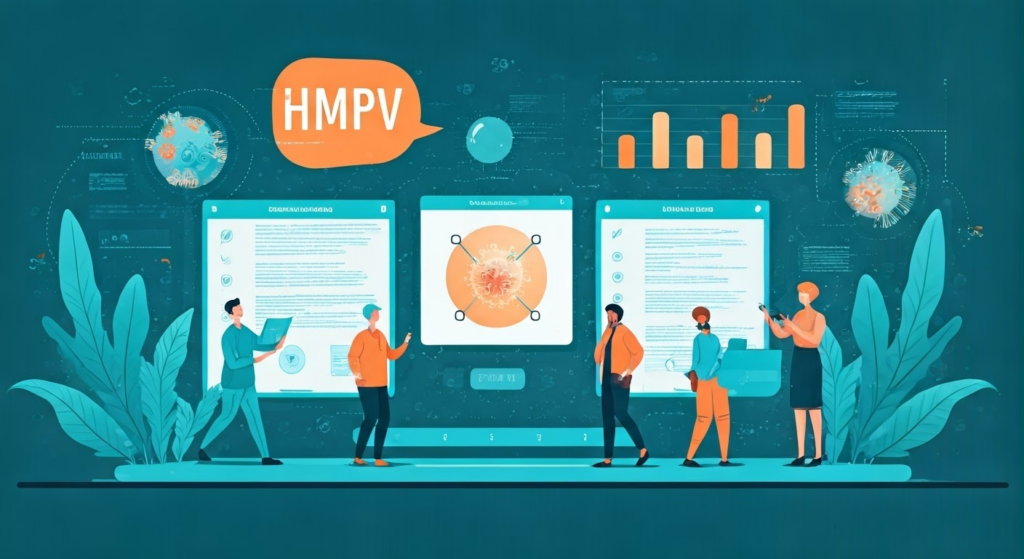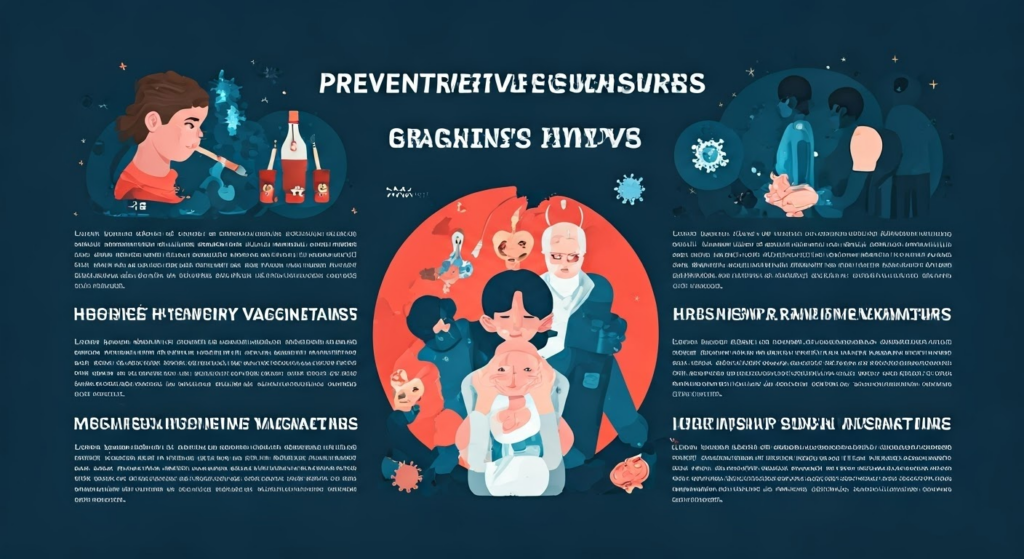Understanding hMPV Symptoms and Prevention

Key Highlights
- Human metapneumovirus (hMPV) is a common respiratory virus that causes cold-like symptoms.
- hMPV spreads through close contact with infected individuals or contaminated surfaces.
- Young children, older adults, and people with weakened immune systems are at higher risk for severe illness.
- There’s no specific treatment for hMPV, and supportive care focuses on relieving symptoms.
- Practicing good hygiene, such as frequent handwashing and covering coughs, is crucial for prevention.
Introduction
Human metapneumovirus (hMPV) is a frequent respiratory virus that can impact patients of all ages. This virus spreads easily and usually causes mild symptoms, like a cold. However, it can be more dangerous for young children, older adults, and those with weak immune systems. It is important to know the common symptoms of hMPV and to use good preventive measures, along with seeking medical advice if severe symptoms arise. This will help reduce the risk of getting hMPV infection and its possible health issues.
Exploring hMPV: An Introduction
Human metapneumovirus (hMPV) is a common respiratory virus that can be associated with respiratory infection. It often causes symptoms that are similar to the common cold. Most people who get hMPV will have mild cases that go away by themselves. However, for some people, especially those who are more vulnerable, it can lead to serious respiratory illnesses. This blog post looks at different aspects of hMPV, including its features, how it spreads, its relationship to the family of viruses, the symptoms it causes, how to prevent it, and answers to common questions.
When we understand hMPV, we can take steps to keep ourselves and others safe. Learning how the virus spreads helps us reduce its spread and lessen its effects on public health.
What is Human Metapneumovirus (hMPV)?
Human metapneumovirus, or hMPV, is a virus that affects the respiratory system. It can make you feel like you have the flu or a common cold. This virus can cause infection of the lung and infections in your lungs and airways, according to the American Lung Association. Knowing the symptoms of hMPV and how to prevent it is important for handling this illness well.
Key Characteristics and Transmission of hMPV
The transmission of hMPV mainly happens when someone has close contact with an infected person, including direct contact. When an infected person coughs or sneezes, they release tiny droplets that carry the virus into the air, contributing to the spread of the virus. Others nearby can breathe in these droplets and get infected.
hMPV virus can also spread indirectly through surfaces that have the hMPV virus on them. For example, if an infected person touches their nose or mouth and then a surface, like a doorknob or a toy, they can leave the virus on that surface. If another person touches that surface and then their eyes, nose, or mouth, they could get infected too.
Because of these ways the virus spreads, it is important to practice good hygiene and cover your mouth when coughing or sneezing. This is especially important during the late winter and early spring months when hMPV cases are more common.
Identifying hMPV Symptoms

Human metapneumovirus (hMPV) usually shows symptoms like those of the common cold or other cough sicknesses, which makes it hard to tell hMPV apart from other viruses just by looking at the similar symptoms; however, specific antiviral treatment is available for those who are severely affected.
It is important to know the common symptoms of hMPV. It’s also important to understand when to see a doctor. Recognizing these symptoms early allows for better care and helps stop the virus from spreading to other people.
Common Symptoms and Their Impact
The symptoms of hMPV usually show up one to five days after you come into contact with the virus. Common respiratory symptoms include a cough, runny nose, nasal congestion, sore throat, and fever. In more severe cases, these symptoms often grow slowly and can be mild or strong, depending on the person.
While fever is common, not everyone with hMPV will have it. If you have a fever and feel uncomfortable, you can use fever reducers like acetaminophen or ibuprofen to help you feel better.
Most people recover from hMPV without any problems. However, some might face more severe symptoms or complications. These can include bronchiolitis, pneumonia, or ear infections.
Recognizing Severe Symptoms and When to Seek Help
While hMPV usually causes mild, cold-like symptoms, you should watch for serious signs of illness, including severe cough and chest pain. If you or your child have any of these symptoms, get medical care right away:
- Difficulty breathing or shortness of breath: This may mean a lower respiratory tract infection like bronchiolitis or pneumonia.
- High fever lasting more than three days: A fever that stays high, even with fever reducers, can mean a more serious infection.
- Worsening symptoms: If symptoms like a cough or congestion get worse or don’t get better after a week, talk to a doctor.
- Signs of dehydration: This is very important for young children and infants. Check for less urination, dry mouth, and no tears.
Getting help early can stop complications. It can also help improve outcomes, especially for those at higher risk of severe hMPV infection.
Strategies for hMPV Prevention

Given how easily hMPV spreads, it is very important to take preventive measures. This protects you and others, especially those who can get severely ill from the virus. Simple steps to control infection can help lower how much the virus spreads.
If you follow these recommendations, you can help make your environment safer and healthier. This can reduce the number of hMPV infections and the problems that come with them.
Effective Hygiene Practices to Reduce Risk
One of the best ways to stop hMPV infection and reduce the risk of spread is to keep your hands clean. Wash your hands often with soap and water for at least 20 seconds. Do this after you cough, sneeze, use the restroom, or are around someone who is sick.
If you don’t have soap and water, you can use an alcohol-based hand sanitizer. Make sure it has at least 60% alcohol. Use enough to cover all parts of your hands and rub them together until they are dry.
Besides washing your hands, you should also take other preventive measures. Always cover your mouth and nose when you cough or sneeze, preferably into your upper sleeve rather than your hands. It’s best to use a tissue or your elbow. Do not touch your eyes, nose, or mouth with unwashed hands. This can let the virus into your body.
The Importance of Vaccinations and Immunity Building
While there is no specific vaccine for human metapneumovirus (hMPV) right now, getting other vaccines is good. Shots like the flu vaccine and the pneumococcal vaccine can help keep your immune system strong. These vaccines protect against other lung infections that can lower your immune strength, making it easier for hMPV to infect you.
Besides vaccines, having a healthy lifestyle is very important. This can help your strong immune system fight off infections like hMPV. Eating a balanced diet with fruits, vegetables, and whole grains is a big part of this.
It is also key to exercise regularly, get enough sleep, and manage stress. These factors all help the immune system work better and protect against infections.
Conclusion
In conclusion, knowing the symptoms of hMPV and how to prevent it is very important for public health. By spotting common symptoms early and keeping good hygiene, we can lower the chances of spreading the virus. Getting vaccinated and building immunity while getting plenty of rest is key to avoiding serious problems. It’s vital to stay updated and take steps to protect the at-risk age groups from hMPV. Stay alert, practice good hygiene, and put your focus on prevention strategies to fight the spread of this respiratory virus effectively. If you have more questions or concerns, check out our FAQ section for extra information.
Frequently Asked Questions
What age groups are most at risk for hMPV?
Young children, especially infants, and older adults are more likely to face hMPV risk factors that make them very sick. People who have a weakened immune system, as well as those with chronic obstructive pulmonary disease (COPD), also have a higher chance of facing serious complications.
https://my.clevelandclinic.org/health/diseases/8272-bronchiolitis
https://pubmed.ncbi.nlm.nih.gov/30666949
